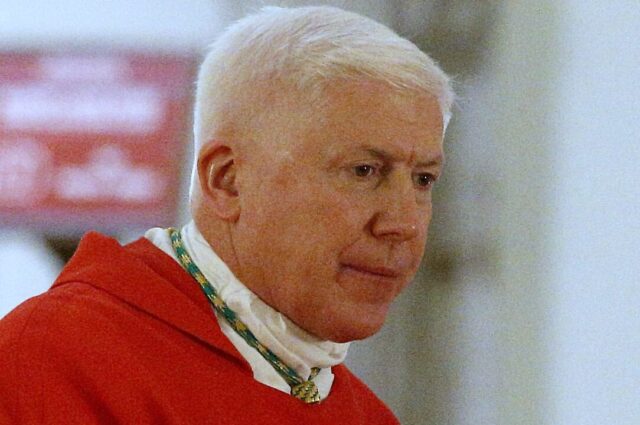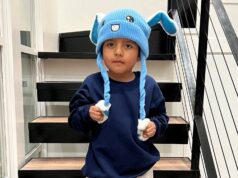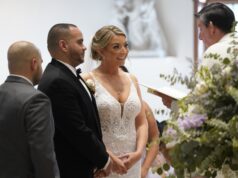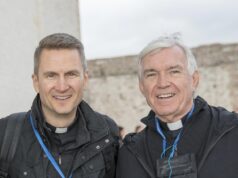
Bishop Daniel E. Thomas of Toledo, Ohio, chair of the U.S. Conference of Catholic Bishops’ Committee on Pro-life Activities, spoke with OSV News Oct. 1, the first day of Respect Life Month, about maintaining hope in a culture with a widespread disregard for human life and why abortion remains the preeminent issue in the “moral hierarchy” of life.
Bishop Thomas told OSV News that he saw the month in the context of the Jubilee Year of Hope since “life is a sign of hope in a world of darkness and a world of violence and the culture of death.”
He also weighed in on the decision by Sen. Dick Durbin, D-Ill., not to receive a “Lifetime Achievement Award,” scheduled to be presented in November by Chicago Cardinal Blase J. Cupich. The award was for his work on immigration issues and had met with significant opposition from several U.S. bishops due to the Catholic senator’s longstanding public position in favor of abortion.
“The first thing I would say is, thanks be to God that Sen. Durbin had the right conscience and the right understanding to turn down the award,” Bishop Thomas said. “I would say that definitively, and I’m very grateful that he made that decision.”
He referenced Pope Leo XIV‘s comments on the matter hours prior to Sen. Durbin declining the award. The pontiff said Sept. 30, “someone who says I’m against abortion but says ‘I’m in favor of the death penalty’ is not really pro-life. Someone who says that ‘I’m against abortion but I’m in agreement with the inhuman treatment of immigrants who are in the United States,’ I don’t know if that’s pro life.”
“So they are very complex issues, and I don’t know if anyone has all the truth on them,” the pope continued, “but I would ask first and foremost that they would have respect for one another and that we search together both as human beings, in that case as American citizens or citizens of the state of Illinois, as well as Catholics, to say that we need to, you know, really look closely at all of these ethical issues. And to find the way forward as a church. The church teaching on each one of those issues is very clear.”
Bishop Thomas said in response, “he says these are complex issues, but at the end of the interview — I don’t know if you saw, some of the things I’ve seen, they’ve cut it off — but at the end, he said, ‘but clearly, the church’s teaching is very clear on these issues.'”
“So I think there is a hierarchy of truths, and I think we have to be able to go back to that question of the vulnerable,” he said. “There’s no question that people across the board are vulnerable, but who are the most vulnerable? Those are the innocent and completely vulnerable little children in the womb who cannot defend themselves. So, you know, if you are for immigration, that’s one thing. But if you are promoting the protection and the promotion of direct killing of infants in the womb, I would say that that’s a very grave matter.”
“I think we have to say there is a moral hierarchy here of life,” he continued. “And that is that, for example, certainly doing one thing or another may be wrong, but the direct killing of children in the womb is the gravest of these things.”
“If you’re caring for immigrants that doesn’t mean you’re pro-life if you are radically advancing and supporting the direct killing of babies in the womb,” he said.
He also pointed out that the award Cardinal Cupich planned to give Durbin was from the Office of Human Dignity and Solidarity and “to give a lifetime achievement award for human rights and solidarity — certainly immigration, care for those immigrants is important — but to completely ignore the reality of the stance of abortion that the person holds in a public forum as a Catholic, I think it would be almost impossible for reasonable people to be able to justify the two.”
“All respect life issues are not equal,” he said, “we respect every life, no matter, but we have to ask ourselves, ‘are some lives more vulnerable than others?'”
Calling abortion the “human rights and justice issue of our time,” Bishop Thomas encouraged the faithful to promote respect for life in this month, keeping in mind that “there’s no greater vulnerability than children in the womb whose lives are threatened with direct killing.”
He said he has observed “a continuing downslide” into “disregard for human life” that St. John Paul II once termed “the culture of death.” He sees that “now playing out even more vividly” on issues that included the “rising rates of abortion and assisted suicide; the killing of innocent school children, even at prayer; the mistreatment of our immigrant sisters and brothers as they endure an environment of aggression; and political and ideological violence inflicted against unsuspecting victims.”
“The question of abortion stands as the preeminent priority for the bishops,” he said. “The overwhelming disregard for life, beginning, of course, first and foremost, with the most innocent, the most vulnerable, and that is babies in the womb.”
“Then are the next vulnerable, if you will, with the frail elderly and assisted suicide,” he continued. “And of course, this horror that we recognized recently, the killing of innocent school children, even at prayer.”
“We just see — most recently in Michigan — other churches, for example, the Latter-day Saints Church, where someone drives in, lights the church on fire, and kills at least four people,” he said. “These are the types of things that are a complete and utter disregard for the human person.”
He said regarding “the mistreatment of our immigrant brothers and sisters who are vulnerable, especially if they’re enduring an environment of aggression,” that while “the church has never and will never call for open borders,” the church “does call for treating men and women who are our brothers and sisters in a human way that respects their human dignity. And that call is across the board, no matter what color of their skin and no matter what language they speak.”
He highlighted the growing “political and ideological violence” in the U.S. saying, “we don’t need to look further than the brutal assassination of Charlie Kirk. I mean, a young husband and father who clearly was an advocate against abortion. And I think all of us see that as an appalling, horrific act.”
He added that it was a “grave” problem that “people would celebrate his death.”
“We can’t just decry the violence,” he emphasized. “We also have to decry the fact that people would even go so far as to celebrate that violence. What depths have we gone to, if that is the case? There’s so much that we need to obviously bring the light of the Gospel of life to our world, the light of Christ who is our hope.”
To Catholics discouraged by the rising rates of abortion after the Dobbs decision, Bishop Thomas referenced the words of St. Paul that “hope does not disappoint,” adding the reminder that “we’re not a people of despair, we’re not a people who do not have the one reason for our hope and that is the person of Jesus, who is our hope in his very person.”
He highlighted the Walking with Moms in Need and Project Rachel ministries as “just two examples of how the Catholic Church continuously reaches out, I say, with love, compassion and mercy to those most in need of a message of hope.”
“The sad impression that the church is only concerned about a baby in the womb is absolutely false,” he emphasized. “The church is concerned about everyone around that baby as well. First and foremost, with the mother, certainly with the father and those who are impacted by the question of abortion.”
He recalled an expression of his father’s that “the parish is where the Catholic Church’s rubber hits the road” saying, on the local level, Project Rachel and Walking with Moms in Need are in parishes throughout the country now with “teams of people who are providing assistance to mothers” and “helping mothers to navigate, for example, housing and clothing and even learning how to care for a baby.”
He encouraged Catholics to invoke St. Joseph in the USCCB’s nationwide prayer for an end to taxpayer funding of abortion every day throughout October. “He was the foster father of Jesus, and he nurtured the life of Jesus in the home at Nazareth,” he said. St. Joseph is a father figure to the universal church, and “sadly, there is so much lack of the figure of fatherhood when it comes to the question of women who are choosing abortion,” he added. “So, Joseph becomes a tremendous patron for this intention.”
He also referenced the committee’s partnership on a Respect Life Month novena with the Hallow app taking place Oct. 22 to 30. He called the novena “a great gift” hoping to reach many with a different bishop each day leading the prayer.









